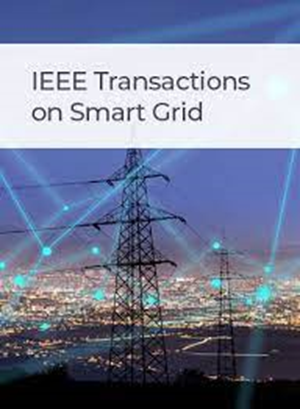基于z源变换器串联耦合和马尔可夫决策过程管理的新型微电网结构
IF 9.8
1区 工程技术
Q1 ENGINEERING, ELECTRICAL & ELECTRONIC
引用次数: 0
摘要
可再生能源是环保的,当整合到直流微电网中时,它们可以解决农村地区的能源问题。它们的主要问题是:存在的随机性、不同数据源之间的耦合以及与存储系统之间的耦合以及对整个集合的管理。因此,提出了一种新的结构,该结构基于源和存储系统的耦合,通过阻抗源(z源)直流转换器串联,并由基于强化学习的智能马尔可夫决策过程管理。为了验证该系统,提供了一个5000w实验室原型的结果,包括三种不同可再生能源分支中的耦合,两个存储系统和一个控制器,所有这些都由基于强化学习的智能系统管理。管理效率在88% ~ 97%之间。所提出的结构允许可再生能源的耦合和最佳管理,以便它们独立工作,并在必要时与直流微电网的其他分支互连。它的主要应用是在偏远地区和居民区。本文章由计算机程序翻译,如有差异,请以英文原文为准。
New Microgrid Structure, Based on Z-Source Converter Series Coupling and Managed by a Markov Decision Process
Renewable energies are environmentally friendly and, when integrated in DC microgrids, they can solve the energy problems of rural areas. As their main problems are: the randomness they present, the coupling between the different sources and between them and the storage systems, as well as the management of the whole set. Therefore, a new structure has been proposed, based on the coupling of sources and storage systems by means of impedance source (Z-source) DC converters connected in series and managed by an intelligent Markov decision-making process based on reinforcement learning. In order to validate the system, the results of a 5000 W laboratory prototype have been provided, consisting of the coupling in a branch of three different renewable sources, two storage systems and a controller, all managed by an intelligent system based on reinforcement learning. A management efficiency of between 88% and 97% was achieved. The proposed structure allows the coupling and optimal management of renewable sources so that they work in isolation and, if necessary, interconnected with other branches of a DC microgrid. Its main application is in remote and residential areas.
求助全文
通过发布文献求助,成功后即可免费获取论文全文。
去求助
来源期刊

IEEE Transactions on Smart Grid
ENGINEERING, ELECTRICAL & ELECTRONIC-
CiteScore
22.10
自引率
9.40%
发文量
526
审稿时长
6 months
期刊介绍:
The IEEE Transactions on Smart Grid is a multidisciplinary journal that focuses on research and development in the field of smart grid technology. It covers various aspects of the smart grid, including energy networks, prosumers (consumers who also produce energy), electric transportation, distributed energy resources, and communications. The journal also addresses the integration of microgrids and active distribution networks with transmission systems. It publishes original research on smart grid theories and principles, including technologies and systems for demand response, Advance Metering Infrastructure, cyber-physical systems, multi-energy systems, transactive energy, data analytics, and electric vehicle integration. Additionally, the journal considers surveys of existing work on the smart grid that propose new perspectives on the history and future of intelligent and active grids.
 求助内容:
求助内容: 应助结果提醒方式:
应助结果提醒方式:


